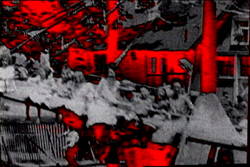WARNING: This work contains throbbing light. Should not be viewed by individuals with epilepsy or seizure disorders.
Ken Jacobs writes: "RAZZLE DAZZLE is an early Edison shot cut off at its head and tail and along its four sides from the continuity of events like any camera-shot from a bygone day; no, like any camera-shot, immediately producing an abstraction. This abstraction pictures a great spinning maypole-like device lined with young passengers dipping and lifting as it circles through space. They look out - from their place at the start of the 20th century - with a remarkable variety of expressions, giddy to pensive. We observe them but of course they see nothing of this, our America, hopelessly gone to rot, its mountaintops leveled for extraction of coal, rivers and air polluted, crisscrossed everywhere with property-lines; they don't see its prisons or the corporations leaning in from their off-shore tax-bases to see what more they can take. Early stereopticon images also appear, digitally manipulated to reveal their depths. A digital shadow falls upon the scene and yet, grim as things get, as our crimes and failures then and now commingle, the movie proceeds with a cubist/abstract-expressionist zest."Click here for a preview of RAZZLE DAZZLE The Lost World, in its entirety.
Assisted by Erik Nelson, Flo Jacobs. Cinematographer: A.C. Abadie, 8 July 1903, Wilmington Springs, Delaware. Music: Morphium - Mischa Spoliansky, Composer/Pianist - Berlin 1927. 12-inch 78 rpm records: Flora Bella - (Schwarzwald), Miss Springtime - (Kalman). In Shadowland - (Brothers). Delilah - (Nicholis). Ladders of Roses - (Hubbell). On The Shore At Le Lei Wi - (Kallimai and Kern). Performed by Prince's Orchestra, Columbia Records.
Exhibition & Distribution Conditions
WARNING: This work contains throbbing light. Should not be viewed by individuals with epilepsy or seizure disorders.
Transcript
Announcer: "Thomas A. Edison, the inventor of the phonograph, has never before permitted his voice to be recorded for the public. Today, however, he has a message for you that is important enough to cause him to break his long established rule. Mr. Edison will now give you that message. I beg to introduce Mr. Thomas A. Edison."
Edison: "This is Edison speaking: Our boys made good in France. The word American has a new meaning in Europe. Our soldiers have made it mean courage, generosity, self-restraint and modesty. We are proud of the North Americans who risked their lives for the liberty of the world but we must not forget and we must not permit demagogues to belittle the part played by our gallant allies. Their casualty list tells the story. However proud we may be of our own achievements, let us remember always, that the war could not have been won if the Belgians, the British, the French and the Italians had not fought like bull-dogs in the face of overwhelming odds. The Great War will live in the minds of Americans for the next hundred years. I hope that when we do reverence to the memory of our brave boys who fell in France, we shall not forget their brothers in arms who wore the uniform of our allies. I believe that the national anthems of France, Great Britain, Italy and Belgium should for all time to come be as familiar to us as our own Star Spangled Banner."
